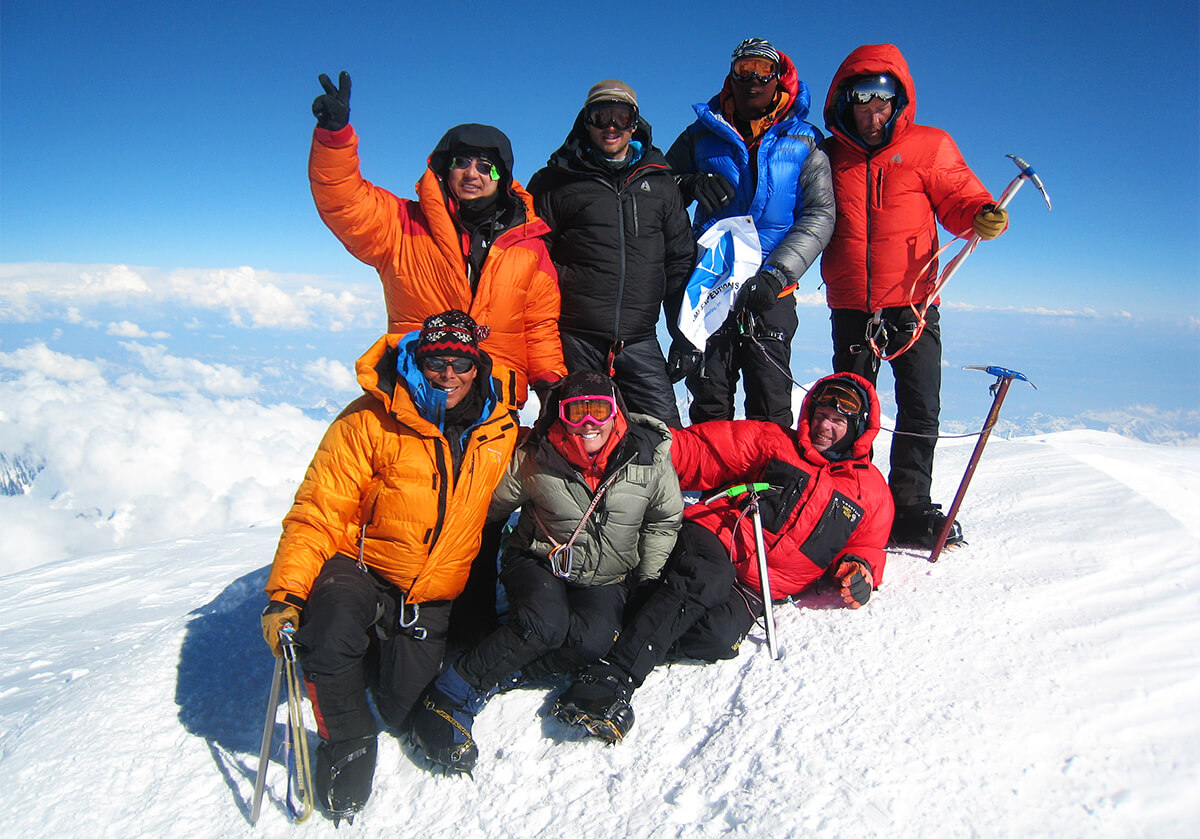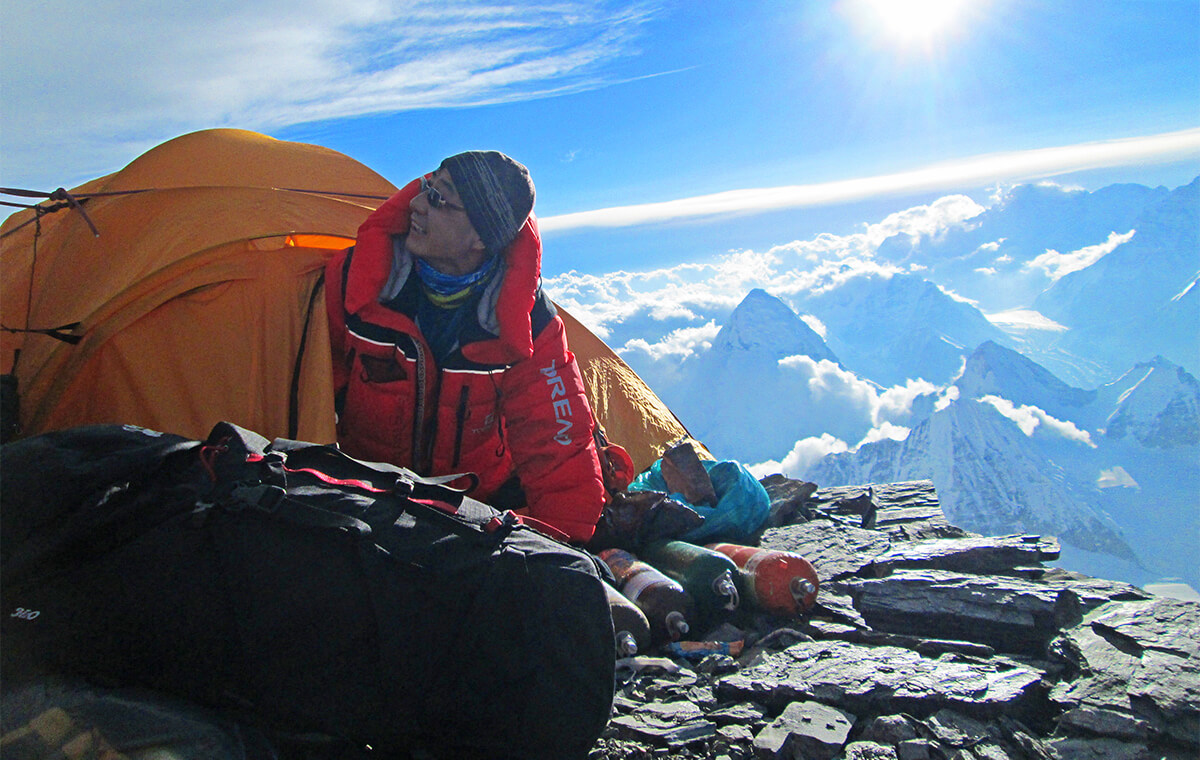Lessons from the Mountaintop
In 1923, famed mountaineer George Mallory uttered one of the most famous quotes of all time when asked why he was attempting to summit Mount Everest. “Because it’s there,” he said.
Mallory disappeared on Everest the following year, and to this day, no one knows if he ever made it to the top before his demise. Still, his statement might be the most succinct summary of humanity’s essential need to be challenged.
In the years since, thousands of climbers have attempted to scale Everest. In 2015, Hao Wu, Ph.D. ECE, ’96, hoped to add his name to that list. For Wu, summiting Everest would bring admittance into the Seven Summits Club, a select group of roughly 500 people worldwide who have climbed the tallest peaks on every continent.
To put that in perspective, that’s fewer people than have been to outer space.
Wu checked the first of these summits off his list when he climbed the highest peak in Africa, Mount Kilimanjaro, in 2005. The next five came in quick succession: Mount Elbrus (Europe) in 2008; Mount Aconcagua (South America) in 2010; Mount Denali (formerly called Mount McKinley, North America), in 2011; Mount Vinson Massif (Antarctica) in 2012; and Carstensz Pyramid (Oceania) in 2015.
For Wu, a talented researcher whose dissertation was on high-energy electronic devices called “gyratrons,” preparing for a climb is in some ways second nature. The methodical and detail-oriented approach to engineering research that he learned at USC Viterbi are equally applicable to mountain climbing.
“My experience as a researcher prepared me immensely for the rigors of mountain climbing,” said Wu. “When we developed our novel gyratrons in the lab, we had to control all the parameters we could while accepting which ones we could not. Preparing for a climb is exactly the same. You have to have all your equipment in place, your route planned out and your body in top form. Even still, unexpected things will happen. If you can’t think this way, you will fail as a researcher and a mountain climber!”
In 2015, halfway up Everest, something unexpected happened.
Wu was resting in his tent at one of the base camps when a shower of ice and snow rained down on him. Moments later the earth began to shake. Someone shouted, “Earthquake!” and everyone took cover. For the next two days, Wu and his team were stranded on the mountain, rationing food and fuel, and with nothing to keep them busy except thoughts of their families back home.
They were eventually rescued by helicopter as the path down the mountain had been seriously damaged, but the relief came with mixed feelings. “Emotionally, it was a very difficult experience. You feel equal parts elated at your own survival while knowing that just a few thousand feet below other people had died in that same accident,” he said.
Of course, things one learns on the mountain can apply to your professional life as well. “By far the most important lesson I learned while climbing is that the biggest challenge isn’t getting to the top — it’s getting down safely,” Wu said.
 That’s a lesson Wu applies to his work as a venture capitalist and partner at Sino-Century Investment Management and as a member of USC Viterbi’s China & East Asia Advisory Board. He is also the former chairman and CEO of Sky Solar Holdings Ltd., in Shanghai. “Experienced climbers know how to reserve energy and plan for their safe descent even before they begin their climb,” he said. “And successful investors likewise plan ahead on how to exit from a position and sell at the right time.”
That’s a lesson Wu applies to his work as a venture capitalist and partner at Sino-Century Investment Management and as a member of USC Viterbi’s China & East Asia Advisory Board. He is also the former chairman and CEO of Sky Solar Holdings Ltd., in Shanghai. “Experienced climbers know how to reserve energy and plan for their safe descent even before they begin their climb,” he said. “And successful investors likewise plan ahead on how to exit from a position and sell at the right time.”
Six years ago on Mount Everest, Wu had to take his own lesson and accept what he couldn’t control. Writing in his journal a few days, Wu reflected back on the reason he loves climbing:
In climbing, we found love, we found peace of mind, we found courage.
We found perseverance, we found health, we found challenge, we found risk.
In climbing we found how to live a life.
In climbing we found how to invest.
Climbing is about the journey not the destination.
With years of experience climbing some of the most challenging mountains on the planet, the peak that holds the top spot in Wu’s heart is the least technical and easiest of all the seven summits. “Kilimanjaro is the only one of the seven summits I climbed with my favorite climbing partner — my wife!” he said. Like so many other USC Viterbi alumni before and since, Wu met his future wife, Fan Xing, right here when they were both students.
As for summiting Mount Everest, Wu tried again a few years later. In 2019, he stood on the top of the world and completed the Seven Summits.




